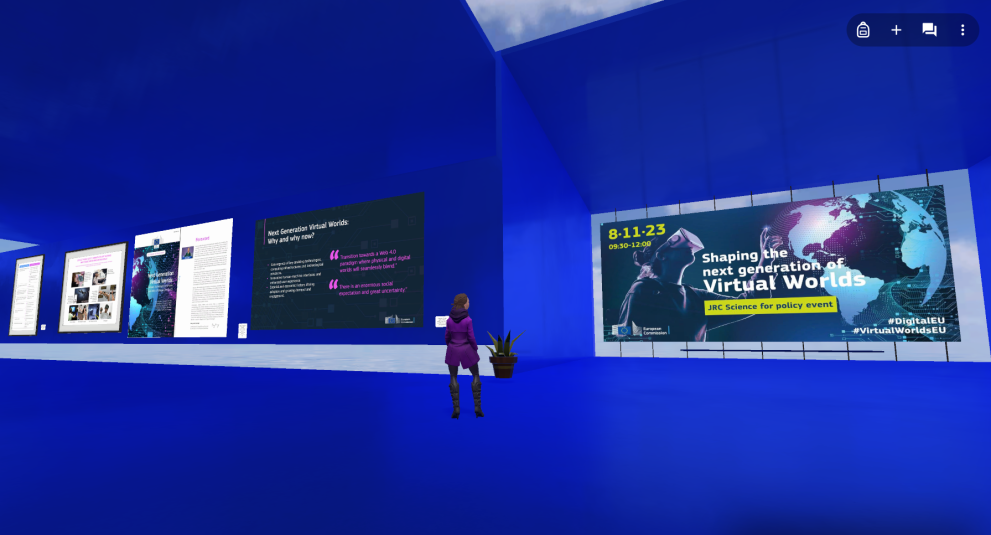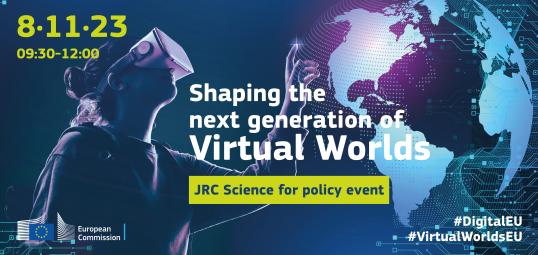
On 8 November, experts from academia, industry and EU institutions joined the virtual event "Shaping the Next Generation of Virtual Worlds – Science for Policy event" organised by JRC’s Digital Economy Unit (T.1).
Isabelle Hupont (JRC) presented, on behalf of large team of authors, the results of the recent report published on the topic, and sparkled conversations focusing on three research areas: public sector, education and economic challenges.
JRC Director General Stephen Quest, opened the event, reiterating the need for policy makers to stay ahead of the curve, supporting the emerging technological trends and mitigating risks; he also stressed the role of anticipation played by sciences, which Virtual Worlds research perfectly exemplifies.
Yvo Volman, Director of Data (DG CNECT), and Francesca Campolongo, Director of Digital Transformation and Data (JRC) joint intervention highlighted that the Commission Strategy on Virtual Words and Web 4.0 is timely and absolutely needed to steer the next technological transition and ensure the respect of EU values, as much as the scientific underpinning of this policy initiative. The upcoming Centre for Advanced Study, focusing on Virtual Worlds research, will fulfil the need to inform policymaking and keep up with the rapidly evolving digital technologies landscape.
Additionally, Cesare Dunken, Policy Officer at Digital Transformation of Industry (DG GROW), shared some industrial application of virtual worlds and how they are foreseen to impact the European industry. Digital Twins in manufacturing and Virtual Reality in healthcare training are just concrete examples of how technologies can improve professionals' performance while saving costs for companies.
The impact of Next Generation Virtual Worlds
The two keynote speakers, Mel Slater and Mavi Sanchez-Vives, distinguished researchers and pioneers in Virtual Worlds studies, provided an extensive overview of the applications of virtual worlds across multiple disciplines such as psychology, education, sociology, journalism, etc.
They showed the profound impact of Virtual Reality (VR) on human perceptions and behaviours via concrete examples of past and current research projects. To cite some:
- Using VR to treat post-traumatic stress disorders, fear of heights, paranoia, chronic pain;
- Using VR in the rehab of prisoners for reducing violent behaviours;
- Using VR for training in corporations.
Finally, three topic-related parallel sessions brought up some important messages:
-
The need for virtual worlds to allow better teaching and learning experiences and to be used where real-life training is either too expensive or dangerous. For instance, for safety training activities, such as aviation or space; the need to use XR to develop the soft skills that go along with hard skills, such as resistance to stress and behaviour for emergency situations; considering the interoperability of solutions when using VR in the Vocational and Educational Training sector.
-
For public administrations, defining the role of relevant private actors and their relationship with the public power when governing the virtual worlds;
-
The importance of boosting the awareness of industry stakeholders on the transformative power of the Virtual Worlds technologies, stressing the need for the key actors to be connected.
Curious to know more? Explore our Virtual Worlds 3D room, where you can explore relevant resources on the Next Generation Virtual Worlds topics and applications, including some of the above-mentioned presentations.
Contact: JRC-DIGITAL-GOVERNANCE ec [dot] europa [dot] eu (JRC-DIGITAL-GOVERNANCE[at]ec[dot]europa[dot]eu)
ec [dot] europa [dot] eu (JRC-DIGITAL-GOVERNANCE[at]ec[dot]europa[dot]eu)
JRC research on Virtual Worlds
Details
- Publication date
- 10 November 2023
- Author
- Joint Research Centre

